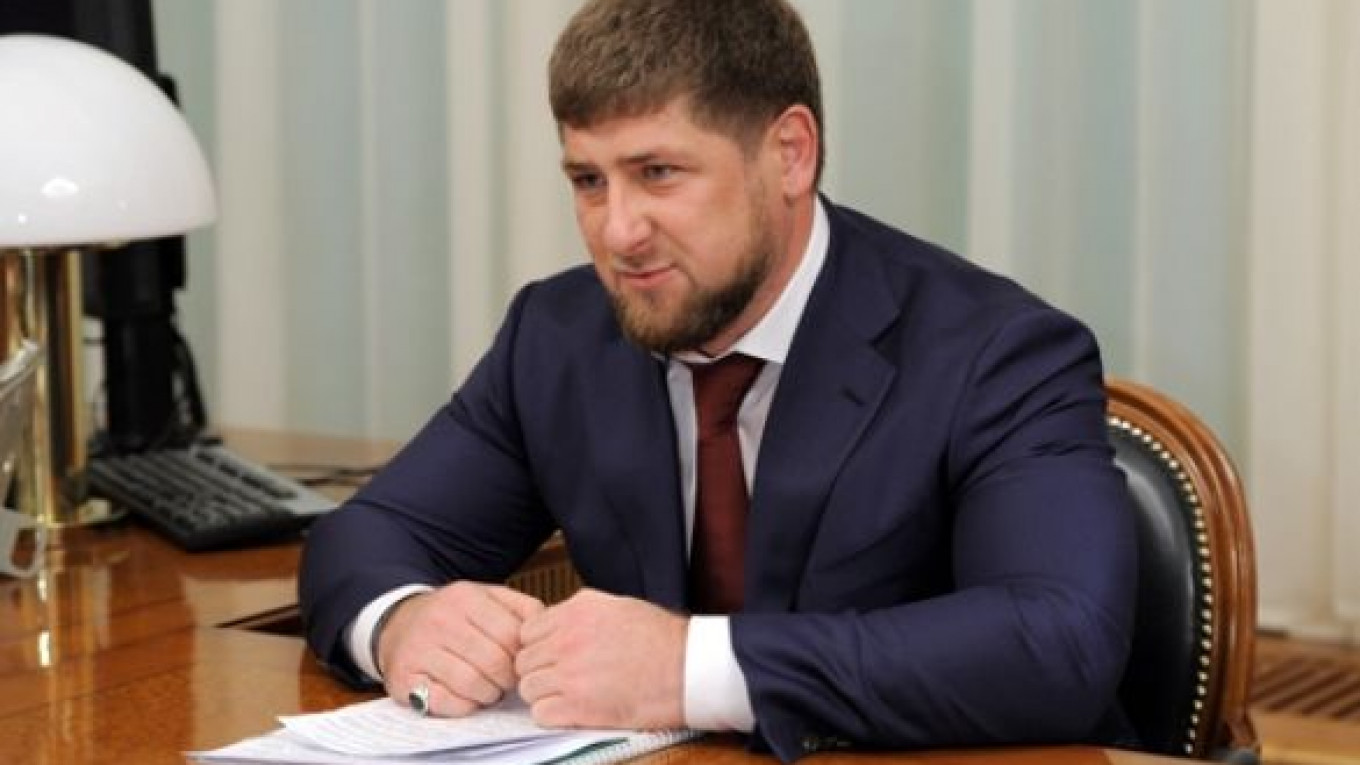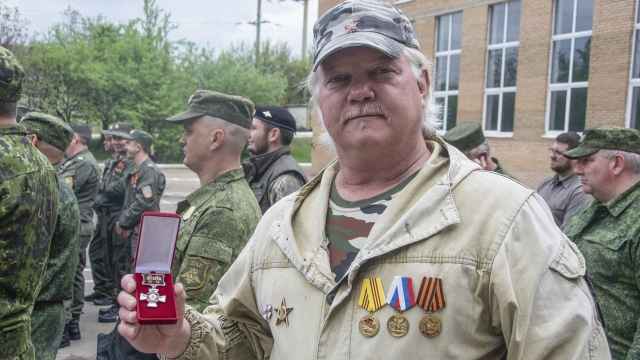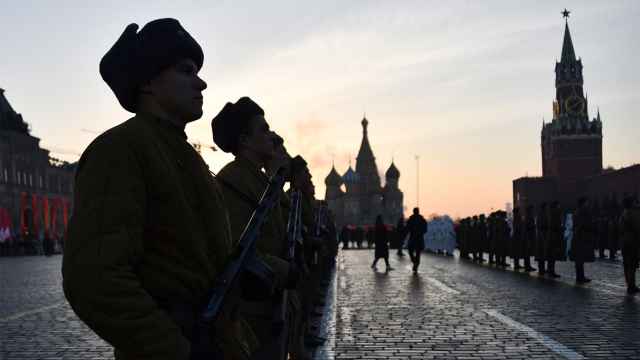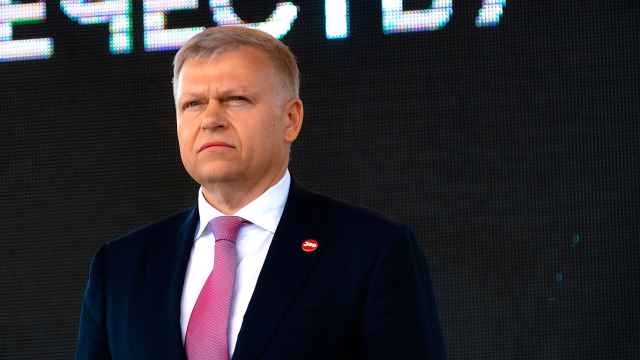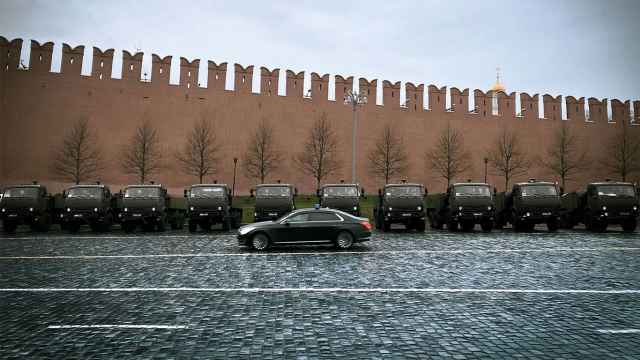A public spat between Chechen leader Ramzan Kadyrov and his Ingush neighbor Yunus-Bek Yevkurov over their regions’ borders simmered Wednesday, leaving observers guessing how the troubled North Caucasus would weather another territorial dispute.
Analysts said the dispute could only be solved by federal authorities, but the Kremlin, the federal government and the presidential envoy to the North Caucasus all remained silent after Kadyrov's latest verbal attack on Yevkurov.
The Chechen strongman had reiterated Tuesday that parts of Ingushetia belong to Chechnya and assailed Yevkurov for making "strange statements" about that.
"The time has come to clearly recognize the boundary. We know our territory and will under no circumstances allow that any of it remains beyond the administrative borders," Kadyrov said at a Cabinet meeting, according to a statement on his website.
While he added that Chechnya wouldn't "infringe on one meter of foreign territory," he complained that Ingushetia took away hundreds and thousands of hectares of "indigenous Chechen land" adjacent to Goragorsk, a border town in the northern plains of Chechnya.
Kadyrov insisted that documents from the 1930s archived in Grozny prove his claim to Ingushetia's Sunzhensky district and part of the Malgobek district. He explained that Ingushetia did not and could not have such documents because the region only joined Chechnya in 1934.
Yevkurov, who has dismissed the claims and warned that they cause "ethnic strife," refused to comment Wednesday. Speaking on Ekho Moskvy radio he merely said that more and more such statements appear every day. "We live on our land. We have no claims to anybody," he said.
Chechnya's claims to parts of eastern Ingushetia stem from the early 1990s, when the former Chechen-Ingush republic split into two after separatists in Grozny declared independence from Moscow while the Ingush decided to remain part of Russia.
Both sides reached an agreement in 2003, when two villages in Ingushetia's Sunzhensky district, Sernovodsk and Assinovskaya, were officially handed to Chechnya.
However, Kadyrov has implied that he wants more ethnic Chechen settlements inside Ingushetia to join Chechnya. Both sides have formed a commission to settle the dispute, which is expected to present a report by Jan. 1.
Prominent Ingush warned on Wednesday that any discussion of border changes was dangerous.
Belan Khamchiyev, a State Duma deputy for United Russia from Ingushetia, said "emotional declarations will only inflame the situation," according to a statement published on the Ingush government website Wednesday.
Kaloi Akhilgov, a lawyer and former spokesman for Yevkurov, warned that the dispute risks more trouble by raising the republic's border dispute with North Ossetia.
"If Moscow allows any changes to the border with Chechnya, this sets a precedent that is very dangerous for the whole country," he wrote on his blog.
Ethnic tension in the Prigorodny district, which has a predominantly Ingush population but has been part of North Ossetia since the deportation of Chechens and Ingush in 1944, led to violence in 1992, in which hundreds of civilians were killed and tens of thousands had to flee.
Some Chechens also said the dispute was wrong. "The people of Ingushetia and Chechnya have other problems," said Israpil Shovkhalov, the editor of Dosh, an independent magazine with offices in Moscow and Grozny.
"I just returned from Ingushetia, and I can assure you that people there are gravely concerned about violence and killings," he said by telephone.
Ingushetia has for years been plagued by violence by Islamist insurgents. On Wednesday, gunmen ambushed a police convoy near the mountain village of Dattykh, killing at least six officers, a local Interior Ministry spokesman told Interfax.
Analysts speculated that Kadyrov brought up the border dispute because he was angered at Ingush law enforcement authorities' ineffectiveness in rooting out rebel bases on their territory.
Kadyrov raised the issue first in early August when he bitterly complained that an explosion in an Ingush village, claimed by Yevkurov to be an accident, had really been an anti-terror operation by Chechen police.
"The Chechen government has seen rebel bases in Ingushetia as a threat for many years," said Alexander Krylov, a Caucasus expert at the Academy of Sciences' Institute of the World Economy and International Relations.
He added that police cooperation between the neighboring republics has long suffered from the ensuing lack of trust and from a lack of coordination from above.
Krylov said that only Moscow or Deputy Prime Minister Alexander Khloponin, the federal envoy to the North Caucasus, could solve the crisis.
The outcome is open, however. Kadyrov is widely seen as the region's most powerful leader because of his close personal ties to President Vladimir Putin, but Yevkurov, a former military officer, is said to enjoy strong support in the federal government's security establishment.
Related articles:



